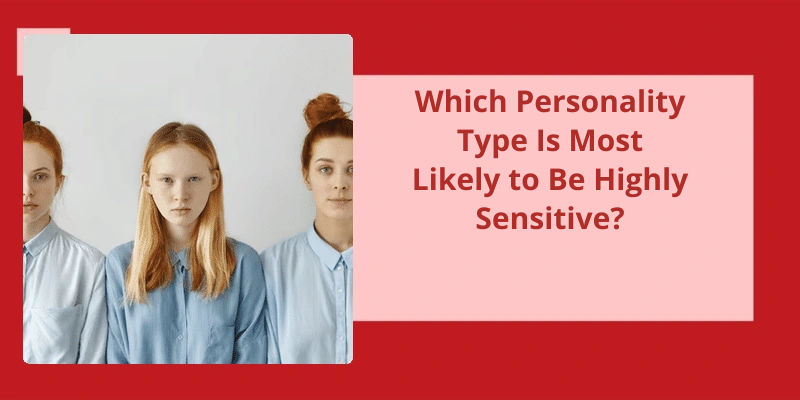As human beings, we all possess a unique personality type that defines who we are, how we perceive the world around us, and how we react to different situations. However, there are certain individuals who’re more sensitive than others, and these individuals are known as Highly Sensitive People (HSPs). While it's difficult to pinpoint which personality type is most likely to be an HSP, research has shown that a significant portion of HSPs are either INFJs or INFPs. These individuals tend to be more in tune with their emotions, more empathetic towards others, and more easily overwhelmed by sensory and emotional stimuli. As an HSP, it's important to understand your triggers, your coping mechanisms, and your unique strengths and weaknesses, so that you can live a fulfilling and balanced life.
Is Being a HSP a Personality Disorder?
Firstly, being a highly sensitive person (HSP) isn’t a personality disorder. Rather, it’s a personality trait thats also known as sensory-processing sensitivity (SPS). This trait is characterized by individuals who’ve heightened sensitivity and emotional reactivity to their environment, including people, places, experiences, and situations.
HSPs often feel overwhelmed or drained by sensory input, emotional situations, and social interactions. They may be more easily affected by things like loud noises, harsh lighting, strong smells, and crowded spaces. They may also be more attuned to other peoples emotional states and pick up on subtle cues in social situations.
While being an HSP can be challenging at times, it isn’t a disorder or a condition. In fact, many HSPs view their sensitivity as a positive aspect of their personality. They may be more empathic, creative, and intuitive than others, and they may have a deep appreciation for beauty and meaning in life.
It’s important to note that some individuals with mental health conditions or disorders may also have sensory-processing sensitivity as a part of their symptomatology. However, this doesn’t mean that SPS is inherently pathological or indicative of a specific disorder.
Are HSP Highly Intelligent?
However, a persons intelligence can’t be solely determined by their sensitivity level. It should be noted that while some HSPs may excel in certain areas of intelligence, it doesn’t mean that all are highly intelligent overall.
What sets HSPs apart is how they process and perceive information. HSPs are highly attuned to their environment and more perceptive to subtleties in their surroundings. This heightened awareness can lead to a deeper understanding and connection to certain subjects, leading to increased mastery and proficiency in those areas. Additionally, HSPs tend to be very introspective and reflective about their experiences, which can lead to greater insights and innovation in their work.
HSPs may also have a greater capacity for creative thinking. This is because their sensitivity allows them to see things from different perspectives and think outside the box. Many creative individuals, such as writers, musicians, and artists, are HSPs who use their sensitivity to tap into their emotions and imagination.
It should be noted, however, that being an HSP doesn’t necessarily equate to success. HSPs may struggle with certain aspects of life, such as social interactions or high-stress environments. This can lead to difficulties in achieving their full potential, despite their innate intelligence and abilities. It’s important to recognize that each individual has their own unique strengths and weaknesses, regardless of their sensitivity level.
The Connection Between HSP and Empathy.
Highly Sensitive People (HSP) exhibit higher levels of empathy due to their increased perception and sensitivity to emotional stimuli. This connection is likely due to the neurological and physiological differences present in HSP individuals.
Individuals with HSP often experience heightened sensitivity to external stimuli, leading to frequent misinterpretation of their symptoms as behavioral issues. One common misdiagnosis is ADHD, which can cause cognitive and attentional problems in addition to sensory sensitivities. Despite the overlap in symptomatology between the two conditions, it’s important for healthcare professionals to differentiate between them to provide effective treatment.
What Is HSP Mistaken For?
On the other hand, individuals with HSP tend to have a higher level of sensitivity to sounds, smells, and sights, but they don’t necessarily experience difficulty in paying attention. Furthermore, HSP can be mistaken for anxiety or depression due to the social and sensory overload that individuals with HSP may experience.
Moreover, HSP can also be mistaken for introversion or shyness, as those with HSP may prefer to spend time alone or in quiet environments.
Similarly, HSP may also be confused with autism spectrum disorder (ASD), as both conditions can involve heightened sensitivity to stimuli and social discomfort. However, the key difference is that HSP isn’t a neurodevelopmental disorder and doesn’t involve difficulty processing nonverbal cues or engaging in reciprocal social communication. Additionally, not all individuals with HSP may experience social discomfort or may do so only to a lesser extent.
Lastly, HSP can be mistaken for personality traits or disorders, such as neuroticism or borderline personality disorder (BPD). Although individuals with HSP may experience intense emotions, neuroticism typically involves a pattern of negative thinking and excessive worry. Similarly, BPD involves unstable relationships and self-image, as well as impulsivity, which aren’t necessarily associated with HSP.
However, it’s important to differentiate HSP from these conditions in order to provide appropriate support and understanding to individuals with HSP. HSP isn’t a disorder but rather a trait that can confer both strengths and challenges in daily life. By recognizing and respecting HSP as a valid aspect of human diversity, individuals with HSP can thrive and contribute to society in meaningful ways.
As we explore the world of Highly Sensitive People (HSP), we find that they possess a unique set of traits and abilities that make them stand out from the rest. Their depth of processing sets them apart as deep thinkers, although this can also lead to over-arousal and anxiety. HSPs also have a remarkable ability to feel emotions deeply, which can be overwhelming at times. Moreover, their heightened awareness extends to sensory-specific sensitivity, where they tend to be overly sensitive to smells, bright lights, loud sounds, tastes, and tactility. Let’s delve deeper into each of these traits to better understand the fascinating world of HSPs.
Are HSP Deep Thinkers?
Highly sensitive person (HSP) is a term coined by psychologist Elaine N. Aron to describe individuals that have a more profound and intense sensory processing sensitivity. HSPs are known to be deep thinkers as they process information more deeply and contemplate things that others may not notice. They’ve a tendency to reflect on things for a long time, considering multiple perspectives carefully before making decisions.
However, this depth of processing can also pose a challenge for HSPs in certain situations. They’re prone to over-arousal, which can lead to anxiety and stress. When dealing with complex situations or overwhelming emotions, HSPs may become mentally exhausted more quickly than others, and they may require time to recharge and process their thoughts. This can make everyday life challenging for HSPs, but with conscious effort and self-care, they can learn to manage their response to over-stimulation and find balance in their lives.
One of the defining features of HSPs is their remarkable capacity for empathy. They’re highly attuned to other peoples emotions and have deep compassion for those around them. This empathy arises from their deep processing ability, which enables them to pick up on subtle cues that others might miss. As they experience emotions more deeply themselves, they’re more likely to offer emotional support to others in need. This makes HSPs valuable friends, partners, and caregivers as they’re able to understand and provide comfort in difficult situations.
In addition to emotional sensitivity, HSPs tend to be sensitive to specific sensory stimuli. They may be easily overwhelmed by bright lights, loud noises, harsh smells, and other sensations that others might not notice. This sensory sensitivity can be challenging in certain environments, but it also has it’s advantages. For example, HSPs are often able to appreciate subtleties in art, music, and food, and they may have a more nuanced and rich experience of these things than others who’re less sensitive.
Conclusion
By recognizing our triggers and limitations, we can learn to navigate our environment in a way that promotes harmony and balance. However, it's important to remember that everyone experiences sensitivity in their own way, and it's up to each individual to explore their emotional landscape and find the tools they need to thrive. Ultimately, the key to a happy and fulfilled life as an HSP is self-awareness, self-care, and a strong support system of like-minded individuals who understand and accept our unique qualities and needs.






